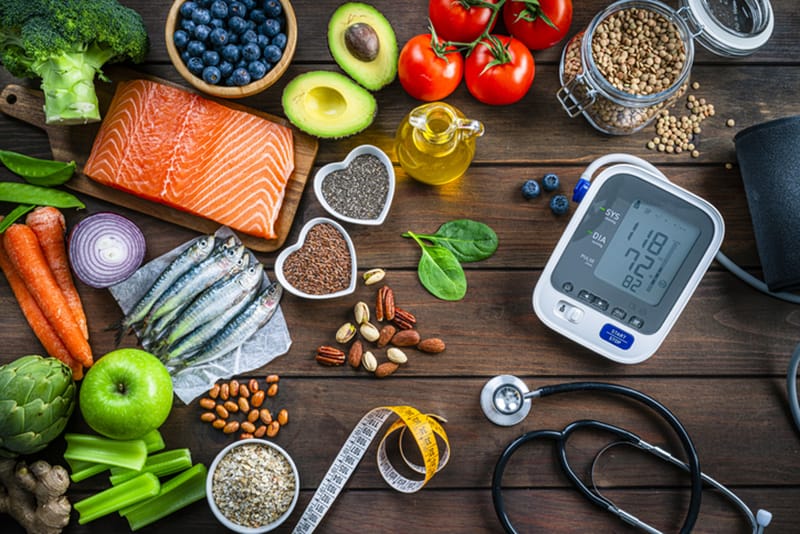Add these yummy foods to your diet to help reduce the risk of heart disease.
The heart is responsible for more than just love. A healthy heart is crucial for a person’s overall health, and the key to maintaining heart health starts with a balanced diet. February is American Heart Month, and it’s a perfect time to highlight the many foods that provide a positive impact on blood pressure, triglycerides, cholesterol levels and inflammation — all of which are risk factors for heart disease. Promote a healthy diet for older adults and reduce the risk of heart disease by incorporating these foods into weekly meal plans.
- Whole Grains: Refined grains such as sugar, white bread, pastries, and white rice can increase the risk of heart disease. Adding whole grains, on the other hand, improves heart health by lowering cholesterol and blood pressure. Try adding the following to your diet:
- Oats
- Brown rice
- Whole wheat
- Quinoa
- Barley
- Leafy Greens: Green, leafy vegetables are packed with vitamins, minerals, and antioxidants. Most are rich in vitamin K which promotes proper blood clotting and protects arteries. Spinach, kale, and collard greens are excellent options.
Berries: The antioxidants in berries, such as strawberries, raspberries, blueberries, and blackberries, fight inflammation that can contribute to heart disease. - Fatty Fish: The word “fatty” can make many health-conscious people cringe, but fatty fish have something great to offer the body — omega 3 fatty acids. Omega 3 fatty acids have been shown to reduce a number of heart disease risk factors, including high blood pressure and cholesterol. Add the following fish to your diet for a much-needed health boost:
- Salmon
- Mackerel
- Tuna
- Sardines
- Olive Oil: Olive oil contains antioxidants and monounsaturated fats that have been shown to lower blood pressure and the overall risk for heart disease. Skip the butter and drizzle a little olive oil in your pan when sauteing veggies or mix up a heart healthy salad dressing using some olive oil, vinegar and Italian seasoning.
- Avocados: Avocados are another great source of monounsaturated fats which are heart-healthy and associated with reduced cholesterol.
- Tomatoes: A ripe tomato is the ultimate taste of summer, and they are packed with lycopene which has been shown to increase HDL (good) cholesterol and lower the risk of heart disease and stroke.
- Walnuts: Walnuts provide a great source of fiber, magnesium, copper, and manganese. Several studies have shown that eating walnuts can help decrease LDL (bad) cholesterol.
- Almonds: The high amounts of fiber and monounsaturated fats in almonds have been linked to reductions in cholesterol and belly fat, both key factors for a healthier heart.
- Garlic: Garlic has been used as a natural treatment for a number of ailments for centuries, and studies show that this pungent food can help to lower blood pressure and cholesterol.
- Seeds: In addition to fish, many seeds are a great source of heart-healthy omega-3 fatty acids. Add chia seeds, flaxseeds, and hemp seeds to your salads and smoothies for a healthy boost.
- Edamame: Edamame, an immature soybean, contains soy isoflavones. These have been shown to help decrease cholesterol levels. Edamame also contains fiber and antioxidants, which are also good for the heart.
- Beans: Beans are an excellent source of fiber, and eating beans has been linked to reduced blood pressure and inflammation.
- Green Tea: Kicking back with a nice cup of tea is a great way to unwind, and green tea has been linked to a number of health benefits, from improving insulin sensitivity to lowering blood pressure and cholesterol.
- Dark Chocolate: Last but certainly not least, dark chocolate is often a surprising source of heart healthy benefits. This treat is rich in antioxidants and has been linked to a lowered risk of developing plaque in the arteries. So, make sure your box of Valentine’s chocolate contains some dark chocolates.
Eating right doesn’t have to be bland or boring. Incorporating these foods into an older adult’s diet can help promote heart-health while still providing enjoyment and variety. For older adults who struggle with planning and preparing heart-healthy meals, Jewish Family Home Care’s experts in Sunrise elder care can help! Our caregivers can help to ensure that seniors maintain healthy nutrition plans, particularly to help reduce the risk of heart disease. Additionally, we can provide friendly companionship during mealtime to help improve the senior’s socialization and appetite. Contact us today at 954-908-5677 to learn more about our in-home care services and how they can help an older adult you love.
